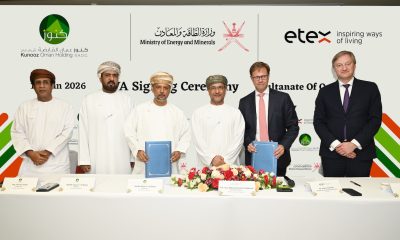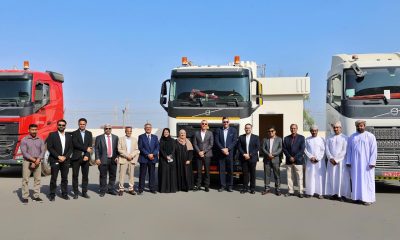Banking & Finance
Keeping ahead of the curve
Sayyid Wasfi, Deputy General Manager – Deputy Head Wholesale Banking, National Bank of Oman, talks about the asset management industry in Oman and the challenges facing fund managers in the country, in an interview to OER.

Sayyid Wasfi, Deputy General Manager – Deputy Head Wholesale Banking, National Bank of Oman, talks about the asset management industry in Oman and the challenges facing fund managers in the country, in an interview to OER.
What aspects of NBO’s service allowed it to win ‘best asset manager in Oman’ for the third consecutive year in the recent MENA Fund Manager Fund Performance Awards?
The asset management industry is ultimately all about performance and delivering strong and consistent returns for clients in line with their unique investment goals and risk appetite. So being named the best asset manager in the Sultanate for three consecutive years is testament to the value we bring to clients year-after-year. It is also testament to the quality of our team and their constant innovation in support of our client base, who are among the most sophisticated and demanding investors in the region.
We have traditionally managed discretionary investment portfolios for large institutional investors. In 2014, however, we were ready to take our offering to a wider audience and we launched the “National Bank of Oman GCC Fund,” an open-ended equity fund that invests in high impact companies in the region and distributes a high proportion of dividends. It was the largest equity fund in Oman by capital and net asset value as of the end of 2014. It is through the launch of highly relevant products like these, developed in close consultation with investors and backed up by copious amounts of research that NBO is able to deliver consistent value and returns to its clients.
The fund industry in Oman is developing rapidly. How does NBO keep ahead of the curve regarding best practice and local market knowledge?
No matter how successful we have been in the past, our focus always remains on delivering success in the future. This requires strong relationships, unquestionable integrity, regional and global expertise, actually listening to investors not just meeting them, and most importantly employing and retaining people who have a keen appreciation for the science as well as the art of investing and a passion for their work and their clients. These practices are not subject to change whatever the prevailing business or market conditions.
How have the demands of investors changed over the last year?
As a result of the financial crisis, investors today are much more sensitised to risk in general and tail risk in particular. Any given year will invariably feature completely unexpected events that have the potential to cause financial market shocks and influence asset prices in ways that were unanticipated. Investors therefore have a more sophisticated understanding of their portfolios and demand much more transparency in the management of their portfolios. This is where National Bank of Oman’s asset management team have always excelled, as working in true partnership with our clients and offering absolute transparency in our dealings is a key feature of our corporate culture within asset management and these are reflective more broadly of NBO’s values as a great Omani and Arab institution.
What are the major challenges facing fund managers in Oman and the wider region presently?
Being able to employ the very best people is essential to success in the asset management industry and yet Oman must compete with many other financial centres around the region as well internationally. National Bank of Oman has invested heavily in its HR infrastructure to create an environment that both attracts and retains exceptional people, and I think the wisdom of this investment is increasingly apparent. We hire and retain passionate people and create an environment where they can excel and exceed even their own expectations of themselves and, more importantly, our clients’ expectations of us.
More broadly, geopolitical issues and currently sovereign fiscal challenges related to a lower oil price environment can be a cause for concern, particularly to potential investors from outside the region. However, these topics offer great opportunities to engage in detailed top-down discussions with investors and the result is more often than not an investor who is more favourably disposed to the region than before.
The dissemination of objective information about the country and the region is a key challenge which together we must overcome. Both the public and private sectors can do more and the hard work will be worth it because our region requires higher levels of foreign investment and we offer plenty of fantastic opportunities for foreign investors. We need to engage with more purpose with a wider investment community and educate through open dialogue, continue to improve upon already good levels of business friendliness and continue apace with infrastructure development, employment creation and economic diversification programmes. The GCC, and notably Oman, has leapt forward leaps and bounds in the past 20 years. The next 20 are not without challenges but we have shown ourselves to be resil ient to challenges in the past and this feature of our makeup will not change. We are today even more resilient, better educated, wealthier, more connected and more personally invested in our own economic destinies than ever before. There are broad based and high levels of intellect, goodwill and energy within the Arab populace and the countries of the region increasingly understand the opportunity which exists to leverage upon human capital in the next phase of our exciting growth story.
-

 News2 months ago
News2 months agoAI Security Conference 2025 Hosted by Securado Highlights the Changing Cybersecurity Landscape
-

 Insurance2 months ago
Insurance2 months agoSupporting Community Wellness: Liva Insurance Sponsors Muscat Marathon 2026 with Free Health Checkups
-

 Interviews1 month ago
Interviews1 month agoEXCLUSIVE INTERVIEW: TLS Rebranding Marks Strategic Leap Toward Innovation, Sustainability & Growth
-

 Insurance1 month ago
Insurance1 month agoLiva Insurance Supports Community Wellness Through “Experience Oman – Muscat Marathon 2026”
-

 Investment3 weeks ago
Investment3 weeks agoLalan Inaugurates Its First Overseas Manufacturing Facility, Marking Sri Lanka’s First Investment in SOHAR Freezone
-

 Banking & Finance1 month ago
Banking & Finance1 month agoA New Platform for SME Growth: Oman Arab Bank Unveils Tumouhi
-

 News3 weeks ago
News3 weeks agoKunooz Oman Holding Partners with Belgian company Etex for Local Gypsum-Based Business Development
-

 Construction4 weeks ago
Construction4 weeks agoInternational Heavy Equipment hosts Open Day at its Refurbished Facility in Sohar Industrial Area






























You must be logged in to post a comment Login